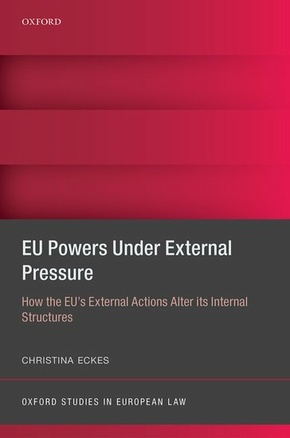EU Powers Under External Pressure - How the EU's External Actions Alter its Internal Structures
| Verlag | Oxford University Press |
| Auflage | 2019 |
| Seiten | 296 |
| Format | 16,3 x 24,4 x 2,3 cm |
| Print PDF | |
| Gewicht | 612 g |
| Artikeltyp | Englisches Buch |
| Reihe | Oxford Studies in European Law |
| ISBN-10 | 0198785542 |
| EAN | 9780198785545 |
| Bestell-Nr | 19878554EA |
This book examines how and where the EU's intensified external actions have impacted its internal constitutional structure, concentrating on how its organisational principles have been influenced and as a result, profoundly alter the involvement of the various EU institutions and the influence of the Member States on the decision-making process.
EU external actions have deep constitutional and institutional implications for EU law and practices. The EU's competences in external relations have continuously increased, including with the entry into force of the Treaty of Lisbon. As a result, the EU has become ever more active in external relations. This has in turn increased the internal constitutional and institutional effects of EU external actions.
This book traces these legal effects and the broader constitutional implications, including potential integrative forces. EU external actions affect the power division between the EU and its Member States and between the different EU institutions; the unity and autonomy of the EU legal order; the role and position of Member States on the international plane; their autonomy; the relationship between national, international and EU law; and the ability of EU citizens to identify who is responsible for a particular action or policy, as well as their legitimate expectation t hat the EU takes action on their behalf.
The chapters demonstrate the interpretation of organizational principles, such as sincere cooperation, subsidiarity, primacy and coherence, changes in the context of external relations; how the choice of an external legal basis rather than an internal legal basis affects the powers of the Union and its Member States; what power shifts happen when policies are determined in international agreements, rather than in internal decision-making; and how EU participation in international dispute settlement mechanisms affects the autonomy and legitimacy of the EU.
Inhaltsverzeichnis:
Introduction: External Relations as a Constitutional Challenge
1: Conceptual Toolkit: Bonding Structures, Autonomy, Effectiveness and Legitimacy
2: EU Loyalty: Framing Legal Relationships
3: Organizational Principles Under External Pressure: Subsidiarity, Primacy, and Coherence
4: Consequence of Choosing a Legal Basis
5: Institutional Powers in External Relations
6: International Courts or Tribunals and the Autonomy of the EU Legal Order
Conclusion: Internal Structures under External Pressure
Rezension:
The book offers important insights into the interconnectedness between law and politics in the context of the EU's external relations and interactions between the EU and the member states. It brings a novel insight into a range of salient contemporary scholarly debates by discussing the EU's legitimacy and actorness. It draws attention to a neglected topic in EU studies by shedding light on the ways in which the EU's external actions affect its institutional and legal structures. Overall, the book offers an important contribution to the literature on EU law and politics. Necibe Nevra Esentürk, International Relations Department, Yalova University, Turkey, Alternatives: Global, Local, Political

